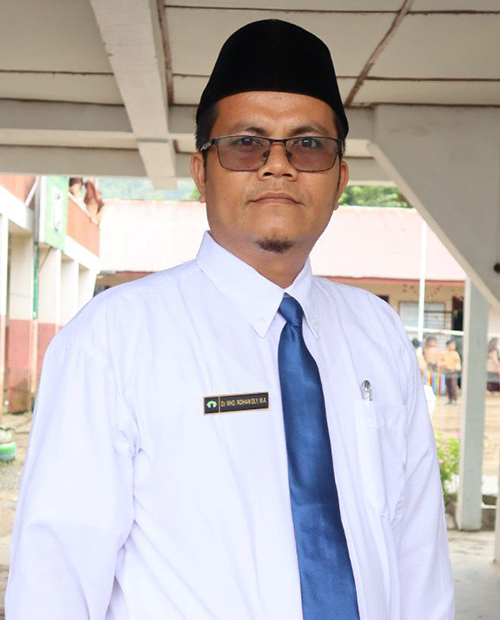Application of Project Based Learning (PBL) Method to Improve Learning Outcomes of The Material on Cultivating Good Morals In Neighboring And Society Life For Students Of MIS Miftahul Huda Bajulan Village, Saradan District, Madiun Regency
DOI:
https://doi.org/10.62945/jcii.v1i1.149Keywords:
Project Based Learnin, morals, learning outcomes, social interactionAbstract
This study aims to analyze the application of the Project Based Learning (PBL) method in improving learning outcomes on the material of Cultivating Good Morals in Neighborhood and Community Life at MIS Miftahul Huda, Bajulan Village, Saradan District, Madiun Regency. The research method used is classroom action research (CAR) with a qualitative and quantitative approach. The subjects of the study were MIS Miftahul Huda students who participated in learning with the PBL method. Data were collected through observation, interviews, learning outcome tests, and documentation. The results showed that the application of the PBL method significantly improved students' understanding of the material, social skills, and their attitudes in interacting with the community. With project-based learning, students are more active in understanding the concept of good morals and applying them in everyday life. In addition, this method also encourages students to work together, think critically, and increase their sense of responsibility in their social environment. Based on these findings, the PBL method can be used as an effective learning strategy in moral education, because it provides a more contextual and applicable learning experience. Thus, PBL contributes to forming better student characters in interacting with their social environment.
Downloads
References
Arends, R. I. (2012). Learning to Teach. McGraw-Hill Education.
Astuti, S. (2020). "Implementasi Model Pembelajaran Berbasis Proyek dalam Pendidikan Karakter." Jurnal Pendidikan Karakter, 8(1), 12-25.
Bell, S. (2010). "Project-Based Learning for the 21st Century: Skills for the Future." The Clearing House: A Journal of Educational Strategies, Issues and Ideas, 83(2), 39-43.
Blumenfeld, P. C., et al. (1991). "Motivating Project-Based Learning: Sustaining the Doing, Supporting the Learning." Educational Psychologist, 26(3-4), 369-398.
Dewey, J. (1997). Experience and Education. Macmillan.
Fauziyah, N. (2019). "Pengaruh Project-Based Learning terhadap Peningkatan Akhlak Siswa di Sekolah Dasar." Jurnal Pendidikan Islam, 7(2), 35-50.
Handayani, R. (2021). "Penerapan Pembelajaran Berbasis Proyek untuk Meningkatkan Keaktifan Siswa." Jurnal Pendidikan Dasar, 9(1), 21-38.
Hmelo-Silver, C. E. (2004). "Problem-Based Learning: What and How Do Students Learn?" Educational Psychology Review, 16(3), 235-266.
Kartika, S. (2018). "Pembelajaran Berbasis Proyek sebagai Upaya Meningkatkan Kemandirian Belajar." Jurnal Ilmu Pendidikan, 6(2), 44-60.
Kemendikbud. (2013). Model Pembelajaran Berbasis Proyek (Project-Based Learning). Jakarta: Kementerian Pendidikan dan Kebudayaan.
Kokotsaki, D., Menzies, V., & Wiggins, A. (2016). "Project-Based Learning: A Review of the Literature." Improving Schools, 19(3), 267-277.
Larmer, J., & Mergendoller, J. R. (2015). "Gold Standard PBL: Essential Project Design Elements." Buck Institute for Education.
Majid, A. (2015). Pendidikan Karakter dalam Perspektif Islam. Bandung: Remaja Rosdakarya.
Nasution, A. (2020). "Pendidikan Akhlak dalam Perspektif Islam dan Tantangan di Era Digital." Jurnal Pendidikan Islam, 9(1), 55-70.
Ningsih, W. (2021). "Efektivitas Model Pembelajaran PBL dalam Meningkatkan Keterampilan Sosial Siswa." Jurnal Inovasi Pendidikan, 5(2), 18-30.
Rahayu, D. (2022). "Peran Guru dalam Implementasi Pembelajaran Berbasis Proyek untuk Penguatan Karakter." Jurnal Pendidikan Karakter, 10(1), 29-45.
Rusman. (2018). Model-Model Pembelajaran: Mengembangkan Profesionalisme Guru. Jakarta: Rajawali Pers.
Subekti, H. (2019). "Metode Pembelajaran Berbasis Proyek dalam Pendidikan Islam." Jurnal Pendidikan Agama Islam, 8(2), 77-90.
Supriyadi, B. (2020). "Pengaruh PBL terhadap Motivasi dan Pemahaman Siswa dalam Pendidikan Akhlak." Jurnal Pendidikan Islam dan Budaya, 4(3), 100-115.
Suyanto, S., & Jihad, A. (2013). Menjadi Guru Profesional. Jakarta: Erlangga.
Thomas, J. W. (2000). A Review of Research on Project-Based Learning. San Rafael, CA: The Autodesk Foundation.
Tilaar, H. A. R. (2002). Pendidikan, Kebudayaan, dan Masyarakat Madani Indonesia. Jakarta: Gramedia.
Trianto. (2014). Model Pembelajaran Terpadu: Konsep, Strategi, dan Implementasi dalam Kurikulum 2013. Jakarta: Bumi Aksara.
Vygotsky, L. S. (1978). Mind in Society: The Development of Higher Psychological Processes. Harvard University Press.
Wahyuni, T. (2018). "Project-Based Learning dalam Pembelajaran Akhlak di Sekolah Menengah Islam." Jurnal Ilmiah Pendidikan Islam, 7(1), 51-67.
Wang, H. C., & Reeves, T. C. (2006). "The Effects of PBL on Student Achievement and Attitudes." Journal of Educational Computing Research, 35(3), 289-310.
Wena, M. (2011). Strategi Pembelajaran Inovatif Kontemporer: Suatu Tinjauan Konseptual Operasional. Jakarta: Bumi Aksara.
Yew, E. H. J., & Goh, K. (2016). "Problem-Based Learning: An Overview of Its Process and Impact on Learning." Health Professions Education, 2(2), 75-79.
Zhao, Y., & Kuh, G. D. (2004). "Adding Value: Learning Communities and Student Engagement." Research in Higher Education, 45(2), 115-138.
Zubaedi. (2011). Desain Pendidikan Karakter: Konsepsi dan Aplikasinya dalam Lembaga Pendidikan. Jakarta: Kencana Prenada Media.
Downloads
Published
Issue
Section
License

This work is licensed under a Creative Commons Attribution-ShareAlike 4.0 International License.










